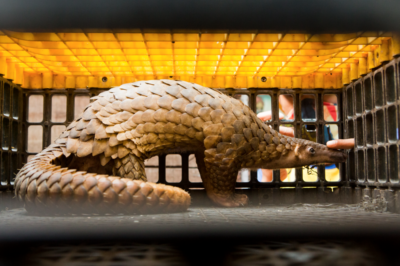
As the coronavirus pandemic continues to unfold, our lives are changing dramatically. For many of us, the global public health crisis is reshaping society in lasting ways. In our 20 years of existence as a nonprofit, we have never faced a challenge quite like this. But with challenges come opportunities, and at WildAid, we believe the time is ripe to permanently close wildlife markets and prevent future zoonotic disease outbreaks.
From Ebola to SARS and now the novel coronavirus (COVID-19), there is a long list of infectious diseases that have the capability to move from animals to humans. Scientists expect there are others yet to emerge as wild habitats continue to shrink and we live in increasingly closer proximity to wildlife. It is clear that conservation is now an issue of public health: the urgent need to protect wildlife is necessary to protect ourselves.
That is why we are especially proud to announce a partnership with the Wildlife Conservation Network’s Pangolin Crisis Fund to immediately begin working in China and Vietnam on a public health awareness campaign. This campaign builds on the current surge in public support for the closure of wildlife markets coupled with effective and permanent regulations to end the wildlife trade.
“We couldn’t be more thrilled to partner with the Wildlife Conservation Network’s Pangolin Crisis Fund to take the necessary steps in Asia that will help permanently close wildlife markets,” said WildAid CEO Peter Knights. “As we’ve seen with SARS, Ebola, and now COVID-19, the commercialization of the wildlife trade is a ticking time bomb, and it will take all of us working together to prevent the next pandemic.”
In China, the government took immediate action after it learned that COVID-19 spread from a live animal market in Wuhan by issuing a wildlife market ban. It also promised stricter laws and penalties combined with better enforcement and public education. We hope a permanent ban will set a strong precedent for the whole of Asia.
“We have long recognized the risks of consuming wildlife, but the “game industry” is still huge and poses a major public health hazard,” said President Xi in February. “No more indifference! I have given instructions on the subject. Relevant departments should strengthen law enforcement, strengthen market supervision, resolutely ban and crack down on illegal wildlife markets and trade, resolutely eradicate the bad habit of indiscriminate eating of wildlife, and control major public health risks at the source.”
While these new measures are a positive and welcomed development, they are only part of the solution. WildAid firmly believes that public education and awareness are key if these new government initiatives are to succeed. With that in mind, we are working closely within official channels and with other partners on a massive campaign designed to educate the public on the dangers and negative impacts of wildlife consumption. Last year alone, our media partners in China donated over $200 million in pro bono placement for our campaign messages.
As a result of our years-long efforts to reduce consumer demand for wildlife products, we are seeing a groundswell of public opinion in China to permanently close down wildlife markets. In a February 2020 poll by Peking University, 97% of the 100,000+ respondents were strongly against consuming wild animals. Additionally, our 2017 PSA with Asian pop star and actor Jay Chou warning of the potential health risks of consuming pangolin meat, was revived by the public and went viral with millions of people in China and the U.S. calling for an end to the wildlife trade. Our slogan, translated as “no trading, no killing” in Chinese, was included in several official government announcements in January and February that persuaded people to stop buying these products.


China is not alone in its use of wildlife markets. In Vietnam, wildlife restaurants still flourish. WildAid investigations have revealed a wide variety of live animals served in local dishes, kept in small cages, or sold and consumed in other ways. But thankfully, earlier this month, Vietnam’s prime minister, Nguyen Xuan Phuc, asked the country’s agriculture ministry to draft a directive to stop illegal trading and consumption of wildlife — a promising sign that hundreds of live animal markets will be shut down permanently. With our local NGO partner CHANGE, we are working with Vietnam’s government to put an end to wildlife consumption and trade by assisting with development of the new set of regulations (as requested by their Prime Minister), enforcing recently strengthened laws, and educating the public about health risks associated with consuming wild meat.
We hope our efforts in Asia will lead to an international movement. We have already begun working to end the wild animal trade in Africa, where urban areas that host live animal markets will face many of the same public health risks as Chinese, Indonesian or Vietnamese cities.
“Africa needs to heed the lessons from China and close down these wildlife markets immediately,” said WildAid ambassador Djimon Hounsou, who traveled with WildAid to Nigeria in 2019. “As well as posing a massive risk to public health, they endanger species and are inhumane.”
We are thrilled to be moving forward with Wildlife Conservation Network’s Pangolin Crisis Fund to increase public awareness and continue to rally support for a permanent ban on wildlife consumption in China and Vietnam. We are confident this partnership will inspire our work around the globe to shut down illegal wildlife markets and the wild meat trade.
While we are proud to capture current global momentum, these initiatives will take time and a massive effort on our part, and to do this we need your help. Together, we can take bold steps to protect the world’s wildlife and reduce the incidences of human-wildlife disease transmission.
Will you join us in the fight to permanently shut down wildlife markets in Asia and the bushmeat trade in Africa?
Stay in touch and get the latest WildAid updates.
SIGN UP
